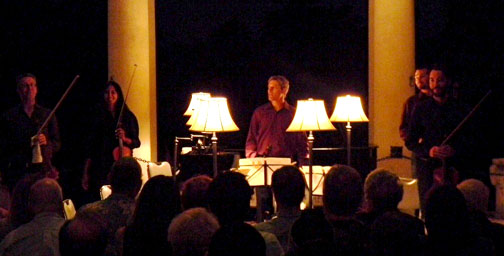
Photo by Ted AYALA
Southwest Chamber musicians with Jim Foscia (center) take a bow after the performance of
Max Reger’s “Clarinet Quintet.”
There are times when one’s trust in the progress of humanity is pricked by doubts and skepticism; whether, despite all our gadgets and undeniable technological splendor, we’ve really evolved much from our primitive, cave-dwelling ancestors. But it’s a sign that, perhaps, we’ve come a long way after all when the music of Brahms and Wagner can now sit side-by-side as it did last weekend at the Southwest Chamber Music concerts at the Huntington Library.
Behind the genteel facade of muttonchops, handlebar mustaches and dainty petticoats, the 19th century roiled with some of the most acrimonious musical rivalries of all time – and none was more bitter than the feud between admirers of Brahms and Wagner. Champion the wrong composer and a person could very well find themselves getting dirty looks from strangers, lose all their friends and get roughed-up by others who were only too happy demonstrate in a hands-on way the error of their opinion, potentially breaking their monocle or pince-nez in the process.
Yet both works represented on Southwest’s program managed to subvert the ossified stereotypes of each composer.
Wagner’s
Album Leaf for Betty Schott was a relaxed Schubertian idyll for piano solo that was so comfortable in its small-scale, intimate salon mood that, save for a telling harmonic modulation here and there, seemed utterly unlike the gigantic musico-dramatic frescoes characteristic of the composer. “Restraint” isn’t exactly synonymous with Wagner’s music, but this brief piano miniature proved that he was able to condense the poetry of his massive operas to smaller canvases as well.
Brahms on the other hand, after a brief youthful period of lushly romantic music, kept his muse on a tight leash, preferring Apollonian rigor over Dionysian vigor.
“Beautiful my music should be,” the composer would write to a friend much later in life, “but perfect it must be – always.”
His “
Trio for Horn, Violin, and Piano, Op. 40,” a chamber piece from his 32nd year, represents one of the last gasps of his early romantic style; its third movement – marked “Adagio mesto” – among the most nakedly heartrending things Brahms ever composed. There are moments, too, when the work wouldn’t sound exactly out of place in Siegfried’s forest. (Though Siegfried still lay over a decade into the future when Brahms composed his trio.)
Despite the acolytes that surrounded them, Brahms and Wagner held a grudging mutual respect for each other’s work, something that can be glimpsed from the former’s trio.
Sitting between the two pillars of 19th century German music in the program was Max Reger, whose densely contrapuntal style attempted to weave both strands together into a highly original idiom that somehow has managed to elude a firmer grip in the repertoire outside of the German-speaking world.
His valedictory “
Clarinet Quintet, Op. 146” from 1916 is Late Romantic chamber music at its apex: ornate, long-breathed and richly expressive. It also was brimming with the humor and wit that sometimes gets overlooked in Reger’s music with a briskly whizzing scherzo that was capped by deft humor and a Mendelssohnian lightness of touch – all of it captured with poise by the Southwest Chamber Music players.
In the Reger, clarinetist Jim Foschia’s instrument poured out streams of liquid chocolate from his instrument, wielding equal parts instrumental finesse and expressive insight that left one wondering why this chamber piece isn’t played more often. The trio of Andrew Pelletier (French horn), Lorenz Gamma (violin) and Ming Tsu (piano) had the full measure of Brahms’ score, digging beyond the notes to tap into the vein of vulnerability and melancholy that rumbles deep behind the composer’s snowy-white beard and his enigmatic blue eyes.